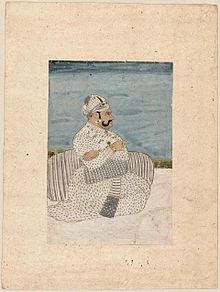Raja Balwant Singh
Dr.Mazhar Naqvi
Two prominent Hindu kings have remained
by and large obscure in the history of Taziadari in India despite playing an
active role in promotion of Muharram ceremonies. One of them, Balwant Singh, had
established Banaras(Now Varanasi) State in 18th century and other was Sawai
Madho Singh of Jaipur royal house.
Balwant Singh made donations for
Taziadari during his life time. His descendants continue the tradition even
today. Every year they dole out money for Taziadari. One of their ancestors had
even donated land for the construction of Fatiman-the burial place of Shia
scholar Hazeen and Karbala of Shias in Varanasi in Sighra locality. The place also
has erected shrines of Bibi Fatima,Imam Hasan,Imam Hussain, Bibi Zanab and
Hazrat Abbas. Muharram processions went their way to Fatiman only for burial of
Tazias and lay the accompanying Standards(Alam) at rest.
It was Raja, who assumed the title of
"Raja of Benares" in 18th century, taking advantage of the Mughal
Empire's disintegration. His descendants ruled the area around Benares as
feudatories of Nawab of Awadh and later East India Company.In 1910,
Benares became a full-fledged state of British India. It is believed that under
the influence of Shia Nawabs of Awadh,Balwant Singh came to know about the
martyrdom of Hazrat Imam Hussain. He found the tragedy of Karbala heartrending
and decided to encourage Taziadari in his dominions. The tradition continues till
today .for the royal family feels incumbent upon him to donate generously for
ram Leela and Muharram processions every year.
Sawai Maadho Singh had inherited love
for Tazias from his father who is credited with initiating the first Tazia of Gold
and Silver in Jaipur.In his regime, Sawai Madho Singh gave fillip to Taziadari
with more interest and generosity. He encouraged other Muslims and Hindus to
keep Tazias and offered them monetary help.

Maharaja Madho Singh
Maharaja Sawai Madho Singh I (December
1728 - March 5 1768) was ruler of the state of Jaipur in the
present-day Indian state of Rajasthan from 1750 to 1768. He
was the younger son of Maharaja Sawai Jai Singh and came on the
throne after the sudden suicide of his elder brother. The ruling Mughal emperor
Ahmad Shah was under great pressure because of the rebels outside and his own Wazir
inside. The wazir had become the de facto emperor. Ahmad Shah sought the help
of Madho Singh who arrived at Delhi in October 1753 to meet the Emperor.
Subsequently, he held long negotiations with Wazir Safdarjung returned to his
own province of Awadh. As recognition for his services Ahmad Shah granted Madho
Singh the fort and district of Ranthambhore. In January 1763, he founded
the town of Sawai Madhpur near Ranthambhore.
It is a well-known fact that mother of
emperor Qudsia Begum was a great lover of Ahle-Bait and she had got renovated the
famous Shah Mardan shrine in Jorbagh area of Delhi. Being a close confident of emperor
and mother-queen Madho Singh,Sawai Madho Singh being a a loyal Rajput considered
observance of Muharram as a solemn duty.Further,he was also aware of the fact
as to how holy Imam had saved the life of his father when the latter was
stricken with a dreaded disease. Later on, he had got prepared Tazia of gold
and silver and kept it in his palace as thanks giving.
(Source:Internet/Wikipedia /Photo Courtesy Google Images
No comments:
Post a Comment